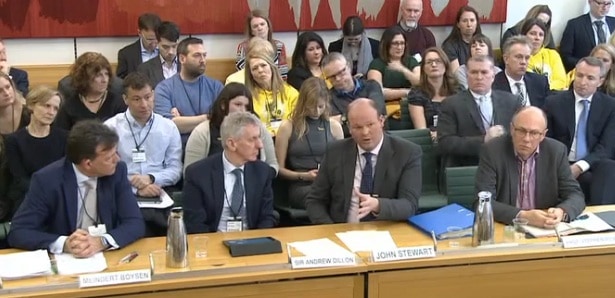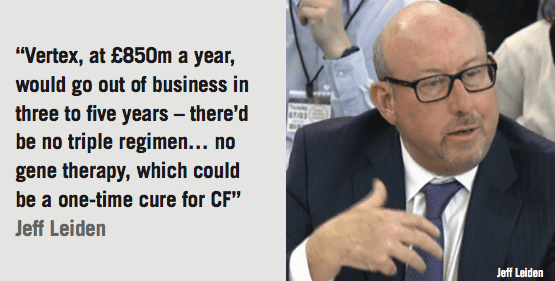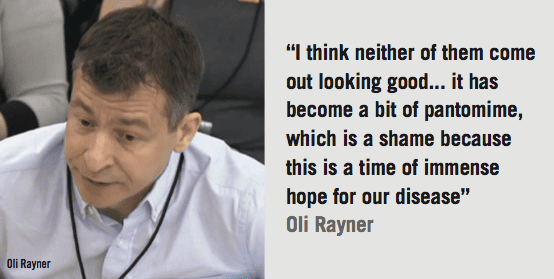
The deadlock between pharma company Vertex and NHS England over cystic fibrosis drug Orkambi was played out in a parliamentary hearing in London on 7 March, when the company’s CEO Jeff Leiden and NHS England and NICE leaders were grilled by MPs.
The hearing was more or less unprecedented in terms of a pharma company’s CEO being called on to explain its tactics before UK Parliament – the questioning of Pfizer’s then-CEO Ian Read and AstraZeneca’s Pascal Soriot about the former’s hostile takeover bid in 2014 being the only similar example from recent history.
The three-hour evidence session also bore some resemblance to the recent interrogation of seven big pharma CEOs by a US Senate committee enquiry into US drug prices, albeit with just one chief executive in the dock on this occasion.
Jeff Leiden had flown to London from Vertex’s base in Boston, Massachusetts to appear before the House of Commons health select committee (in contrast, it was noted, to another high profile US CEO, Facebook’s Mark Zuckerberg, who declined a similar invitation to talk about its fake news controversy).
Leiden proved to be equal to all the questions thrown at him, and at least matched his counterparts from NICE and NHS England in terms of personal likeability and the credibility of their testimony – thereby proving that the Orkambi row won’t be solved easily with political intervention.
As with the US inquiry, the committee of MPs covered a broad range of topics – some questions trying to get to the nitty-gritty of health economics and NICE procedure to understand why talks had failed so far, while some bigger questions focused on risk and reward in pharma and healthcare.
These included questions to Jeff Leiden about his salary, the company’s profits and taxes paid in the UK, and allegations from President Trump that European countries such as the UK were ‘freeloading’ while high US prices provide the incentive for the industry’s R&D-based business model.
Getting to the bottom of the Orkambi row
Both NHS England and Vertex had thrown accusations of foul play at each other via public statements and the media in recent months: NHS England accusing Vertex of being an “extreme outlier” and the US pharma company talking of “outrageous” demands from NHS England – but in person the testimony was far more measured.
The two sides remain deadlocked over how to reach a deal on the drug, which was first launched in Europe three years ago, with both sides blaming the other for inflexibility on the cost and value of the drug, which has a list price of £104,000 ($136,000) per patient per year.
The health and select committee intervened to try to break the impasse, and perhaps determine if any side might carry more of the blame.
The case has generated frustration and anger from patients, their families and campaign groups, who say some patients have died because they have missed out on receiving Orkambi over the last three years.
They have taken some heart from the hearings, which seemed to generate a new willingness to return to negotiations with NHS England and NICE – although both sides had accused the other of ‘walking away’ from talks.
“We will negotiate with them [NHS England and NICE] any time or any place,” said Leiden. “I think we will reach a reimbursement deal with them. And I will commit that once we have reached [that agreement], we can have the treatment to patients within four weeks.”
Leiden revealed towards the end of his hour-long question and answer session that he would ‘finally’ have a meeting with health secretary Matt Hancock the following week, and expressed confidence that this could open up the chance of a deal being done.
The pressure is on both NHS England and Vertex to come up with a solution, especially as Scotland has recently agreed on a pricing and reimbursement deal with the company. Leiden added: “It could be the same price as Scotland. That’s the quickest way.”
He said he hoped Hancock’s intervention could be key. “I am really hopeful that he can get us and the NHS back to the table, and we are eager to meet with them and try out some of these new ideas.”
Deciphering the feasibility of this hope was difficult for the MPs, as Scotland’s deal with Vertex remains confidential.
The ‘world’s best deal’ on Orkambi
Nevertheless, it’s clear that there will have to be some movement between the two sides, as Vertex says it has already offered England its lowest (confidential) price anywhere in the world.
NHS England meanwhile broke the normal protocol when it revealed its offer to Vertex: a total of £500m over the next five years, or £1bn over ten years to include the price of its existing CF treatments Kalydeco and Orkambi, as well as new combination Symkevi and any subsequent products.
NICE’s chief executive Sir Andrew Dillon and NHS England’s John Stewart, national director, specialised commissioning, were both on hand to argue that Vertex had been exceptionally ‘inflexible’ in its approach to negotiations.
However, Stewart was also challenged by the committee, who claimed that NHS England was trying to claw back costs after giving Vertex what the budget holder had since judged to be an overly generous deal on Vertex’s first CF drug, Kalydeco, in 2012.
The committee heard that NHS England’s offer meant that the price per patient for Orkambi under the ‘best and final’ offer was less than £8,000 a year – less than Pulmozyme, a much older drug with more limited benefits.
John Stewart said the Kalydeco deal had probably set “unhelpful, unrealistic expectations”, but said the five-year deal governing this arrangement had now ended, and NHS England needed to agree on a far more cost-effective deal with Vertex on its CF portfolio.
The pharmaceutical company had asked NHS England to look at the entire portfolio in order to generate a single pricing and reimbursement agreement for its current and future CF therapies.
Jeff Leiden was given a thorough grilling by the MPs about Vertex’s prices, negotiating tactics and even his own $1.7m annual pay deal, but succeeded in appearing to be as genial and open to finding a solution as his counterparts at NICE and NHS England.

He said that because NHS England had disclosed its £8,000 per patient price, that would mean all other countries would demand the same if Vertex accepted this deal.
“We have been painted as not willing to take the 90% offer – it’s not that we won’t take it, we can’t take it.”
He said this price, if applied to every country, would result in Vertex’s total CF revenues being around £850m a year – nowhere near enough to sustain the company or its future R&D.
“Vertex, at £850m a year, would go out of business in three to five years. There would be no triple regimen, which I have promised patients around the world. There would be no gene therapy, which could be a one-time cure for CF, that I have also promised patients around the world, and there would be no new treatments for other diseases, such as sickle cell disease and alpha-1 antitrypsin, which we are working on.
“Again, it is not that we will not take the offer. We really cannot do so and fulfil our promise to patients around the world that we will find them all the medicines for their diseases.”
NICE’s Andrew Dillon made particularly eyebrow-raising remarks about Vertex’s negotiating tactics, claiming the company had been “unique in my 20 years of working in NICE” because it demonstrated “no flexibility”, with negotiations simply going “round in circles to examine ever more detailed aspects of NICE’s methodology, as if the solution to this problem is redesigning NICE simply to enable the NHS to pay Vertex more money.
It is not the right way to go about it, and we need Vertex to understand that it is its approach to engaging with us that is frustrating the NHS’s ability to make these treatments available”.
He added that the company wanted societal benefits, such as reduced impact on social security payments and payment of taxes through return to work, to be factored in to Orkambi’s cost-effectiveness – something which NICE is unable to do.
By contrast, Leiden claimed Vertex merely wanted NICE to factor in more direct savings to healthcare costs – such as greatly reduced hospitalisation and the need for lung transplants.
Leiden also claimed the breakthrough in Scotland came when NICE’s equivalent, the SMC, agreed to ‘flex’ its methodology – something which he and other industry leaders said is vital if NICE is to capture the full value of specialist medicines for small populations.
The distance between the two sides still seemed great by the end of the three-hour session, although the public airing of the problems has been a catalyst for renewed talks, with hopes rising of a breakthrough in the coming weeks.
Speaking from a patient perspective, Oli Rayner said the new generation of drugs has brought great hope to people with CF, and the two sides should stop their bickering.

“I think neither of them come out looking good particularly… it has become a bit of a pantomime, which is a shame because this is really a time of immense hope for our disease.”
The health select committee has yet to complete its inquiry, but will produce its recommendations within the next few months. However, as NHS England, NICE and Vertex are now back in talks, all sides will be looking to resolve the dispute if they can before that time.




